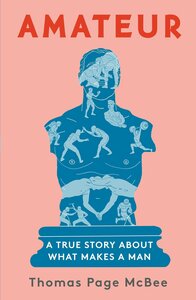Take a photo of a barcode or cover
Wow. This is so many stories in one. The writing is beautiful, as is the spirit of the writer. It is both a personal quest to understand the man he has become, while at the same time a sociological interrogation of gender and our culture surrounding it. Plus, boxing! As a boxing coach at a queer-embracing, "radically-inclusive" gym, I was fascinated by this narrative that spoke to so many of my experiences - and also asked some questions I've been walking around with. Bottom line, this should be required reading for literally everyone. It is, most assuredly, a knockout.
Thomas Page McBee wrote an earlier book, Man Alive, about his transition; this one, Amateur, is about his attempts to learn to box in order to fight in a charity match at Madison Square Garden. (He did it, becoming the first trans man to box there in the process.) As its subtitle would suggest, this is fertile ground in terms of seeing questions about manhood through the lens of violence, aggression, love, and the moments where those three things can be synonymous, and the moments where they are not. It is, as I said on Instagram, a book about being a good man, and a book about punching someone in the face. McBee is especially good on moments of disorientation, where he sees himself from the outside: not just flashbacks to his changing physique, but also quieter moments when he realises he’s failed to be the ally to women that he thought he was. (There’s a particularly painful moment when he and his brother both talk over his sister despite her knowing more about the topic of discussion. There’s also a thought-provoking incident at the start of the book, where another man tries to start a fight with him on the street. He’s not targeted for being trans; the other man doesn’t register that at all. Rather, McBee sees it as emblematic of a particular kind of male anger, one that lacks the vocabulary to ask to be loved. It acts as something of a catalyst for him in his attempts to discover what kind of man he wants, or needs, to be.) For me, as a woman who has never been either sporty or masculine-presenting, the scenes in McBee’s training gym were like secret dispatches from an alien culture: the men who teach him to hit are also the men who wrap his hands and treat his cuts and pour water into his mouth. At the very end of the book, when he finally comes out to his training coach, he discovers that the coach already knows, and has only been wondering when McBee will trust him enough to say it. The technical stuff about fighting and the more personal, psychological content is beautifully intertwined (and it’s especially nice to know that McBee’s girlfriend Jess, who makes several appearances in the book, usually with a tarot deck nearby, is now his wife). A must-read, and not just for folks interested in LGBTQ writing/issues.
Originally published on my blog,
Originally published on my blog,
A MUST read! The writing is beautiful, the pain points and joys relatable, the discussion/inquiry into toxic masculinity revealing, heartfelt, sparking of further discussion. Will read again!
Really nice, quick read that started an internal dialogue for me on how I view men (trans or otherwise) and the concepts of masculinity. Thomas Page McBee shares some very intimate details and perspectives that are unique to individuals who have been raised differently than they themselves identify. While I cannot relate, I do appreciate the complexity of human nature and how each of us does not fit 100% into one end of the spectrum.
emotional
hopeful
informative
inspiring
medium-paced
Eh. It was particularly interesting to read this immediately following reading Janet Mock’s newest memoir, which I devoured in less than 24 hours. This one I had to take breaks from and come back to because, frankly, I got sick of him. I as a transmasculine person am desperate for stories with which I can identify, but oddly I identified more with her story and her analysis than with his, a story about a man training to box and grappling with questions about masculinity and violence that felt lacking in depth and hinged on a gender binary he never really questioned. I appreciated his awareness and mention of people’s work about the intersections of race, class, and gender and the ways that whiteness has always been used to shore up masculinity, and vice versa, but I think even here he misses important points about power and the systems that determine normative bodies, as evidenced by his seeming confusion that class was also in the above intersection—because rich white cis het men want to preserve their power. But everyone knows this, right? McBee presents it as if it is news, and with a much less thorough understanding than Mock’s. Eh.
A trans man learns to box ahead of a charity match, and thinks about masculinity (chapter titles such as "Am I Passing?" "Am I sexist?"). Bonus that he writes for Quartz so it's all in wonderful and clear prose.
challenging
emotional
informative
inspiring
reflective
fast-paced




